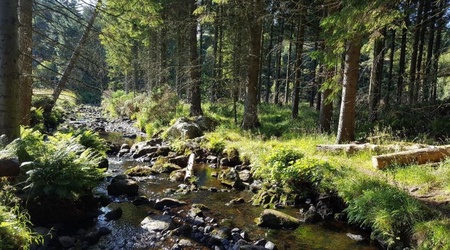A study led by the University of Aberdeen is one of six major research projects to benefit from a £3 million funding pot to explore the most effective ways to expand the UK's trees, hedgerows, woodlands and forests in rural and urban settings.
Forests and other treescapes account for 13% of the UK’s land surface and capture approximately 21 million tonnes of carbon dioxide a year*, providing an important contribution to the UK’s goal of reaching net zero carbon emissions by 2050. They can also reduce flooding, improve biodiversity, reduce pollution and benefit people’s wellbeing.
The six interdisciplinary studies announced today have each received a share of £3 million funding over the next two years from UK Research and Innovation. Each project will improve our understanding of the composition of treescapes in the UK, and their value to people and the planet. The research will also support the Government’s ambition to increase tree cover across the country.
The Farm Tree project, which has secured £0.5 million of funding, is focused on balancing farm and landscape-scale demands for integrating trees on agricultural land.
It will see researchers build on existing agroforestry initiatives and develop practical tools for farmers to enhance the expansion of trees on agricultural land, including:
- A reference set of planting schemes for farms that are situated on a variety of landscapes and including detailed information on their environmental effects on the land.
- A web-based tool for farm managers that demonstrates and visualises the optimal schemes for their farms, with an indication of the environmental and socio-economic impacts on the farm’s land and farming business.
- Recommendations for government policymakers on the best strategies for planting trees on farmland in the UK.
- A framework for a long-term, co-designed monitoring programme of planting schemes in rural areas.
Dr Josie Geris, Senior Lecturer in hydrology at the University of Aberdeen’s School of Geosciences, will lead the project team which includes a diverse group of environmental and social scientists from the University and the James Hutton Institute.
She said: “The project focusses on the environmental value of integrating trees on farmlands, while also considering the socio-economic opportunities and barriers in realising this.
“The UK has diverse landscapes and farming systems. We will explore which planting scenarios could work best under different combinations of environmental and socio-economic conditions, helping to improve farmer decision making and aid the development of better targeted and more flexible policies and grant schemes.”
The team will focus on Scotland as the main study region and explore how agroforestry could make important contributions to water resources management, achieving Scotland’s ambitious policy target of reaching net zero by 2045, and wider benefits.
“The diversity in landscape and climate conditions across Scotland will allow for outputs to be transferable across many parts of the UK and other temperate regions,” added Dr Geris.
Collectively, the six projects will:
- Investigate new approaches to woodland expansion, including natural colonisation.
- Develop practical tools for farmers to support the expansion of tree planting on agricultural land.
- Study the development of agroforestry, which is the growing of trees alongside crops and livestock farming on the same land, in rural areas and surrounding towns and cities.
- Establish a web-based tool that will map the risk of woodland and farmland damage caused by deer.
- Establish how to bridge the gap between national objectives of net zero and tree planting targets, and how to practically achieve that at a local level.
- Understand the potential to diversify the composition of tree species in woodland to increase resilience to climate change, pests and diseases.
The studies are part of the £15.6 million Future of UK Treescapes programme. The programme is designed to answer the ‘what, where, how and for whom’ of treescape expansion and will help us to better safeguard our trees, woods and forests. The research will also investigate the importance of tree expansion in urban spaces, why we connect with woodlands, and how we encourage landowners and farmers to plant more trees.
Julie Urquhart, Associate Professor of Environmental Social Science at the Countryside and Community Research Institute, University of Gloucestershire, is joint Ambassador of the programme. She said: “The UK is one of the least wooded areas of Europe, with only 13% forest cover. They are a precious resource and part of the solution to tackling the climate and ecological emergencies we face.
“These new projects will show how we can effectively support those who manage our treescapes to expand these habitats and improve our environment while at the same locking up carbon to tackle climate change.”
Clive Potter, Professor of Environmental Policy at Imperial College London and joint Ambassador for the Future of Treescapes programme said: “This further set of projects will expand and help refine the work already being conducted via the Call One projects.
“I’m looking forward to welcoming the new teams into the treescapes research community and working with them to deliver research that will directly inform how we achieve the Government’s ambitions for trees, woods and forests in this country."
Professor Sir Duncan Wingham, Executive Chair of the Natural Environment Research Council, part of UK Research and Innovation, said: “The grants announced today demonstrate UKRI’s commitment to funding excellent, world-leading research that is tackling key environmental, societal and cultural challenges.
“The insights gleaned from these projects will support policymakers and landowners as they manage, protect and expand UK woodlands.”
More information about the Future of Treescapes programme can be found on the programme website and the UKRI website.


